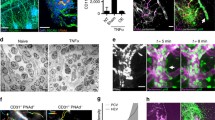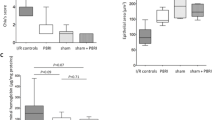Abstract
We have previously demonstrated that intra-abdominal contamination increases neutrophil infiltration into the gastrointestinal tract. The purpose of our current study was twofold: 1) to determine if leukocyte adherence to the mesenteric microvasculature occurred by local peritoneal contamination or by systemic mechanisms; and 2) to assess the role of platelet activation factor (PAF) in this process. Rats underwent cecal ligation and puncture (CLP), and 4 h after the procedure we used intravital microscopy to visualize the mesenteric microcirculation. Cecal ligation and puncture increased leukocyte adherence (22.3 ± 5.5 leukocytes/100 μm) vs. sham (2.3 ± 0.9, P < 0.05). WEB-2086, a PAF receptor antagonist, prevented this increase (6.47 ± 4.8, P < 0.05). To assess if leukocyte adherence was due to topical effects, we performed similar experiments with the small bowel exteriorized. In such cases, CLP did not increase leukocyte adherence (1.2 ± 0.8 vs. 1.4 ± 0.9). In addition, topical application of highly diluted fecal matter (1 : 1000) increased leukocyte adherence (4.8 ± 1.2) vs. control (0.6 ± 0.3, P < 0.05). Our study demonstrates that leukocyte adherence in the mesenteric microcirculation following intra-abdominal contamination is due to direct topical exposure to fecal matter, and it is mediated by PAF.
Similar content being viewed by others
REFERENCES
PARRILLO, J. E., M. M. PARKER, C. NATANSON, A. F. SUFFREDINI, R. L. DANNER, R. E. CUNNION, and F. P. OGNIBENE. 1990. Septic shock in humans. Advances in the understanding of pathogenesis, cardiovascular dysfunction, and therapy. Ann. Intern. Med. 113: 227.
FRY, D. E., L. PEARLSTEIN, R. L. FULTON, and H. C. POLK, JR. 1980. Multiple system organ failure. The role of uncontrolled infection. Arch. Surg. 115:136.
FARTHMANN, E. H., and U. SCHOFFEL. 1998. Epidemiology and pathophysiology of intraabdominal infections (IAI). Infection 26:329.
NIEUWENHUIJZEN, G. A., E. A. DEITCH, and R. J. GORIS. 1996. Infection, the gut and the development of the multiple organ dysfunction syndrome. Eur. J. Surg. 162:259.
WAYDHAS, C., D. NAST KOLB, M. JOCHUM, A. TRUPKA, S. LENK, H. FRITZ, K. H. DUSWALD, and L. SCHWEIBERER. 1992. Inflammatory mediators, infection, sepsis, and multiple organ failure after severe trauma. Arch. Surg. 127:460.
HINSHAW, L. B. 1996. Sepsis septic shock: participation of the microcirculation: an abbreviated review. Crit. Care Med. 24:1072.
HOSFORD, D., M. KOLTAI, and P. BRAQUET. 1993. Platelet-Activating Factor in Shock, Sepsis, and Organ Failure. In: The Pathophysiology of Shock, Sepsis, and Organ Failure, Edited by G. Schlag and H. Redl. Springer-Verlag, Berlin, pp. 502-517.
WOOD, J. G., Z. Y. YAN, and L. Y. CHEUNG. 1992. Gastric microvascular actions of platelet-activating factor: role of leukocytes. Am. J. Physiol. 262:G537.
BEYER, A. J., D. M. SMALLEY, Y. M. SHYR, J. G. WOOD, and L. Y. CHEUNG. 1998. PAF and CD18 mediate neutrophil infiltration in upper gastrointestinal tract during intra-abdominal sepsis. Am. J. Physiol. 275:G467.
SMALLEY, D. M., J. G. WOOD, E. W. CHILDS, L. L. FRANK, and L. Y. CHEUNG. 1998. Platelet activating factor (PAF) increases leukocyte adhesion but does not alter vessel diameter in the rat mesenteric microcirculation. Microvasc. Res. 56:271.
CHILDS, E. W., J. G. WOOD, D. M. SMALLEY, F. A. HUNTER, and L. Y. CHEUNG. 1999. Leukocyte adherence and sequestration following hemorrhagic shock and total ischemia in rats. Shock 11:428.
PANES, J., and D. N. GRANGER. 1998. Leukocyte-endothelial cell interactions: molecular mechanisms and implications in gastrointestinal disease. Gastroenterology 114:1066.
BIENVENU, K., N. HARRIS, and D. N. GRANGER. 1994. Modulation of leukocyte migration in mesenteric interstitium. Am. J. Physiol. 267:H1573.
MULLIGAN, M. S., E. SCHMID, G. O. TILL, T. E. HUGLI, H. P. FRIEDL, R. A. ROTH, and P. A. WARD. 1997. C5a-dependent up-regulation in vivo of lung vascular P-selectin. J. Immunol. 158:1857.
STAHL, G. L., D. V. CRAFT, P. H. LENTO, and A. M. LEFER. 1998. Detection of platelet-activating factor during traumatic shock. Circ. Shock 26:237.
PATRICK, D. A., F. A. MOORE, E. E. MOORE, C. C. BARNETT, JR., and C. C. SILLIMAN. 1996. Neutrophil priming and activation in the pathogenesis of postinjury multiple organ failure. New Horiz. 4:194.
KOIKE, K., E. E. MOORE, F. A. MOORE, F. J. KIM, V. S. CARL, and A. BANERJEE. 1995. Gut phospholipase A2 mediates neutrophil priming and lung injury after mesenteric ischemia-reperfusion. Am. J. Physiol. 268:G397.
CZERMAK, B. J., M. BRECKWOLDT, Z. B. RAVAGE, M. HUBER LANG, H. SCHMAL, N. M. BLESS, H. P. FRIEDL, and P. A. WARD. 1999. Mechanisms of enhanced lung injury during sepsis. Am. J. Pathol. 154:1057.
Author information
Authors and Affiliations
Rights and permissions
About this article
Cite this article
Smalley, D.M., Childs, E.W. & Cheung, L.Y. The Local Effect of Paf on Leukocyte Adherence to Small Bowel Mesenteric Venules Following Intra-abdominal Contamination. Inflammation 24, 399–410 (2000). https://doi.org/10.1023/A:1007008027483
Issue Date:
DOI: https://doi.org/10.1023/A:1007008027483




